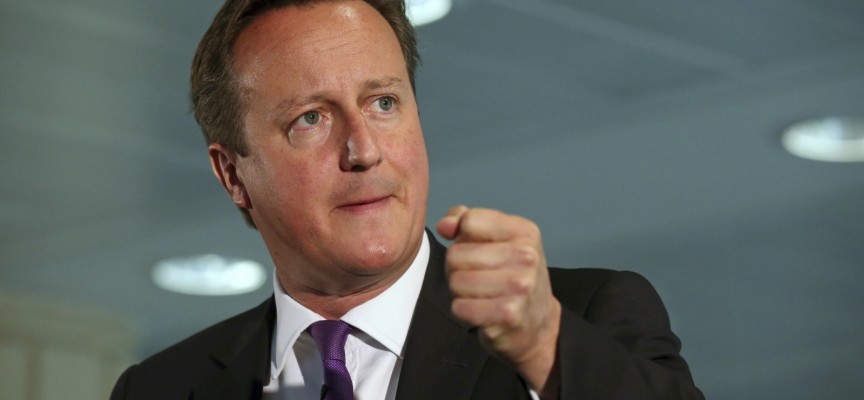We shouldn’t blame anybody for the actions of their parents, so it isn’t fair to blame David Cameron for the financial arrangements of his father. His own financial arrangements, although they involve sums of money beyond the experience of the vast majority of the population, seem to be realtively unremarkable, as this very detailed and fair-minded assessment by tax expert Jolyon Maugham QC finds.
Nor can we assume that a person shares the values or principles of their parents, so if Ian Cameron did anything wrong, that should not reflect badly on the Prime Minister either.
But when a person becomes an adult, forming their own opinions and values, and aspires to elected office, then we are actively invited to assess their character, their values and beliefs. In fact, Mr. Cameron is on record as saying that he believes the character of a politician is actually more important than their policies. He said,”in the end the real test of being a prime minister, or a president or a cabinet minister, is how you respond to the difficult crises that are put in front of you. That is when character and your reaction come to the fore…That’s all about character, and in the end I think that’s more important than any one particular policy.”
A main plank of Mr. Cameron’s policies throughout the six years he has been Prime Minister has been to steadily and relentlessly cut the incomes of the poorest and most disadvantaged sections of the population. Throughout this time he has maintained a lofty aloofness to the realities of what these policies mean to people’s lives. He has airily waved away all concern about the steadily rising need for foodbanks, and shown an alarming but presumably genuine ignorance of the policies his own government was pursuing. He famously asserted in the House of Commons on more than one occasion that disabled people were exempt from the bedroom tax, whilst his own government was busy fighting its way through the courts to make disabled people pay the bedroom tax.
Whilst insisting that such policies and cuts were needed to reduce the deficit, he simultaneously approved a succession of tax cuts for wealthy people just like himself. As Economists for Rational Economic Policies concluded in its 2016 Budget Report, “There is no long-term economic plan; Osborne’s strategy is one of redistribution by taking from those who least can afford it.”
At the same time, Mr. Cameron has shown no marked reluctance to make a claim on the public purse. Despite his own considerable wealth, and the fact that his wife comes from a family that is perhaps even wealthier, it has been revealed in the last few days that Samantha Cameron has been provided with the services of a personal fashion adviser, on a salary of £53,000 per year, at taxpayers expense. Surely this could have been funded by the Camerons themselves?
In this context, it is worth reminding ourselves of the sums people receive to live on, who rely on the welfare benefits that have been frozen and cut by Mr. Cameron’s government.
Carers Allowance, for someone who may have had to give up a job to look after a loved one, and which is only payable if they spend at least 35 hours per week on caring duties – £62.10 per week. Jobseekers Allowance is £73.10 per week for people over 25, and just £57.90 for those under 25. Employement ad Support Allowance, for people who have been assessed by the government as being too ill or disabled to work, is currently up to £102.15 a week for people in the work-related activity group, but for new claimants in future will be cut to £73.10.
So whilst we cannot hold David Cameron responsible for the family he was born into or the actions of his late father, we can deplore the fact that someone so fortunate has chosen to pursue policies which, amongst many other things, have caused sick and disabled people to choose between heating and eating, have caused children to go to school hungry, and have caused a steep rise in homelessness.It is said by people who know David Cameron that he always feared that his wealthy background could damage his political ambitions. But he was a man very much in control of his own destiny. He could have chosen to really listen to, and learn from, people who were not born with his advantages, and to form his ideas and policies accordingly. Instead he appears to have remained enclosed within his own little world of wealth, privilege and entitlement, to have acted in the interests of people like himself, and given very little thought or care to the consequences of his policies for people immeasurably less fortunate than himself. Leaving aside his wealth and his tax returns, that is where the Prime Minister, who ought to be governing for the whole country, has gone sadly wrong.
(source: Ekklesia – April 10, 2016)
Non si dovrebbe incolpare nessuno per le azioni dei propri genitori, quindi non è giusto incolpare David Cameron per le iniziative finanziarie di suo padre. Le sue personali iniziative finanziare, anche se coinvolgono somme di denaro superiori a quanto la stragrande maggioranza della popolazione possa possedere, sembrano essere relativamente insignificanti, come spiega una valutazione molto dettagliata e imparziale dell’esperto fiscale Jolyon Maugham QC. Né si può supporre che una persona condivida i valori o principi dei propri genitori: quindi se Ian Cameron ha fatto qualcosa di male, ciò non dovrebbe ricadere negativamente sul primo ministro.
Ma quando una persona diventa adulta, dà forma a proprie opinioni e valori e aspira a una carica politica, allora siamo caldamente invitati a valutarne il carattere, i valori e gli ideali. Cameron avrebbe detto di credere che il carattere di un politico è in realtà più importante delle sue politiche. Ha infatti affermato: “Alla fine il vero banco di prova di un primo ministro o di un presidente o di un ministro è il modo in cui risponde alle difficili crisi che si devono affrontare. Questo è il momento in cui emergono il carattere e la capacità di reazione. È tutta questione di carattere, e alla fine penso che sia più importante di qualsiasi politica particolare”.
Un elemento principale della politica di Cameron nel corso dei suoi sei anni da primo ministro è stato di tagliare costantemente e inesorabilmente i redditi delle fasce più povere e svantaggiate della popolazione. In tutto questo tempo ha mantenuto un grande distacco da ciò che queste politiche significano per la vita delle persone. Ha ariosamente sventolato via ogni preoccupazione per il crescente ricorso alle “banche del cibo” (organizzazioni caritatevoli che distribuiscono prodotti alimentari ai non abbienti, ndt) e ha dimostrato un’ignoranza allarmante ma presumibilmente autentica riguardo alle politiche che il suo governo sta perseguendo. È risaputo che abbia affermato alla Camera dei Comuni in più di un’occasione che le persone disabili erano esenti dal pagamento della cosiddetta “bedroom tax” (il taglio ai sussidi per la casa per le famiglie che hanno una stanza in più rispetto alle loro necessità, ndt), mentre il suo governo era impegnato a combattere in tribunale la battaglia per far pagare alle persone disabili la suddetta tassa.
Mentre insisteva sul fatto che tali politiche e tagli erano necessari per ridurre il deficit, allo stesso tempo ha approvato una serie di tagli alle tasse per i ricchi, proprio come lui. Come il gruppo “Economists for Rational Economic Policies” ha scritto nella sua relazione sul bilancio 2016, “non c’è nessun piano economico a lungo termine; la strategia di Osborne (cancelliere dello Scacchiere del governo Cameron, ndt) è di redistribuire prendendo da quelli che meno se lo possono permettere”.
Allo stesso tempo, il signor Cameron non ha mostrato alcuna reticenza a fare ricorso alle finanze pubbliche. Nonostante la sua notevole ricchezza, e il fatto che sua moglie provenga da una famiglia che è forse ancora più ricca, è stato reso noto in questi ultimi giorni che Samantha Cameron ha ricevuto i servizi di un consulente di moda personale, con uno stipendio di 53.000 sterline l’anno, a spese del contribuente. Una spesa che sarebbe potuta essere pagata dagli stessi Cameron. In questo contesto, vale la pena ricordare le somme che le persone ricevono per vivere, sulla base delle prestazioni sociali congelate e tagliate dal governo Cameron.
Il sussidio per gli accompagnatori, cioè per coloro che devono rinunciare a un lavoro per prendersi cura di una persona cara, e che è elargito solo se trascorrono almeno 35 ore alla settimana nei servizi di cura, è di 62,10 sterline a settimana. L’indennità per chi è alla ricerca di un lavoro è di 73,10 sterline a settimana per persone con più di 25 anni, e solo 57,90 sterline per chi ha meno di 25 anni. L’indennità d’integrazione salariale e di sostegno per le persone che sono state valutate troppo malate o disabili al lavoro è attualmente di 102,15 sterline a settimana, ma per i nuovi richiedenti in futuro sarà ridotta a 73,10 sterline.
Così, mentre non possiamo considerare David Cameron responsabile per la famiglia in cui è nato o per le azioni del suo defunto padre, deploriamo il fatto che qualcuno così fortunato abbia scelto di perseguire politiche che, tra le molte altre cose, hanno spinto le persone malate e disabili a scegliere tra il riscaldamento e il cibo, hanno fatto sì che bambini vadano a scuola affamati, e hanno generato un forte aumento dei senzatetto.
Persone che conoscono David Cameron dicono che egli abbia sempre temuto che la sua origine ricca potesse danneggiare le sue ambizioni politiche. Ma era un uomo certamente in grado di controllare il proprio destino. Avrebbe potuto scegliere di ascoltare e imparare da persone che non sono nate con i suoi vantaggi, e di formare di conseguenza le sue idee e le politiche. Invece sembra essere rimasto chiuso nel suo piccolo mondo di ricchezza, privilegi e diritti, di aver agito nell’interesse di persone come lui, e di esser stato molto poco in pensiero o preoccupato per le conseguenze delle sue politiche sulle persone estremamente meno fortunate di lui. Lasciando da parte la sua ricchezza e le sue dichiarazioni dei redditi, questo è il punto su cui il primo ministro, che dovrebbe governare l’intero Paese, ha tristemente sbagliato.
(fonte: Ekklesia – 10 aprile 2016; traduzione italiana a cura di Eurcom)
Bernadette Meaden
Latest posts by Bernadette Meaden (see all)
- David Cameron and money - 12 aprile 2016











